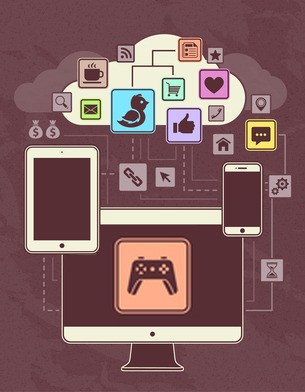From Joysticks to Likes: The Merger of Social Media and Gaming

 Facebook is part of our daily routine and we can Tweet in our sleep. Social media has become so compelling and integrated into our lives, we return time and time again to check out our newsfeeds and update our lists. The continued development of new features has increased the time spent on social media, to the point where Experian Media reports 27 percent of the hours spent online involve social media. The ability to play games directly on our Facebook feeds has been a large factor in our increased time on the site. How has gaming and social media converged?
Facebook is part of our daily routine and we can Tweet in our sleep. Social media has become so compelling and integrated into our lives, we return time and time again to check out our newsfeeds and update our lists. The continued development of new features has increased the time spent on social media, to the point where Experian Media reports 27 percent of the hours spent online involve social media. The ability to play games directly on our Facebook feeds has been a large factor in our increased time on the site. How has gaming and social media converged?
Freemium Apps
Nearly every game on Facebook allows users to play free of charge. Instead of demanding cash up front, the gaming industry has learned to profit through social media’s “freemium” craze. While you can play games like Candy Crush on Facebook without ever needing to put a dime into the game, many users pay small amounts to upgrade or unlock items. Games require you to collect points, wait certain periods of time or complete puzzles in order to level up or gain an upgrade. PLayers who don’t want to wait or go through all of the extra steps can buy levels and upgrades with real money. The games are designed to make you impatient so you are willing to pay to skip a tedious step or side quest. Prices can range from a dollar even up to to $100.
Some Facebook and social media games have other ways to pay for content. Some require users to scroll through ads or watch a video in order to get to the next level, while others require subscriptions or need players to complete surveys. Freemium games are not just exclusive to social media, however. Major game titles like “Team Fortress 2″ and “League of Legends” have launched on a free-to-play model with for-cost upgrades. These social games can be accessed through any mobile device or computer.
Off-Console Play
Triple-A gaming titles released for consoles cannot generally be played on social media networks, but that does not mean the gaming stops as soon as you turn off your Xbox or Playstation. Origin.com launched the Battlefield 4 app and social media platform in order to encourage BF4 players to connect online, develop friendships based on the in-game experience and compare their performance to others in their networks. Social users can compare their statistics, including that all-important kill-death ratio, then look for recruiting clans and even set up their characters for the next firefight.
Traditional gaming consoles have taken a big step toward social gaming by connecting your personal information and acting as almost a social media profile in itself. Gamers can connect and play together in a new and more personal way, furthering satisfaction but also posing security risks. Console gamers should be careful not to provide too much personal information when accessing online social games.
Social Gaming Platforms
Though many games offer Facebook pages or Twitter updates for their fanbases, only one company has taken the effort to provide a social platform dedicated to games themselves. Valve’s popular PC-gaming platform Steam lets users launch games with the click of a button and even trade games to fellow users. Steam offers the same features as social media, including profile pictures, chat, and friend lists, and now will let users do so on their very own Steam Machine console in 2014. Will the Steam Machine be popular enough to de-throne the major titans of the gaming industry like Microsoft, Sony, and Nintendo? While that remains to be seen, Valve is betting that the social aspect of the Steam Machine will prove as popular as the games offered at launch.
[image error]



